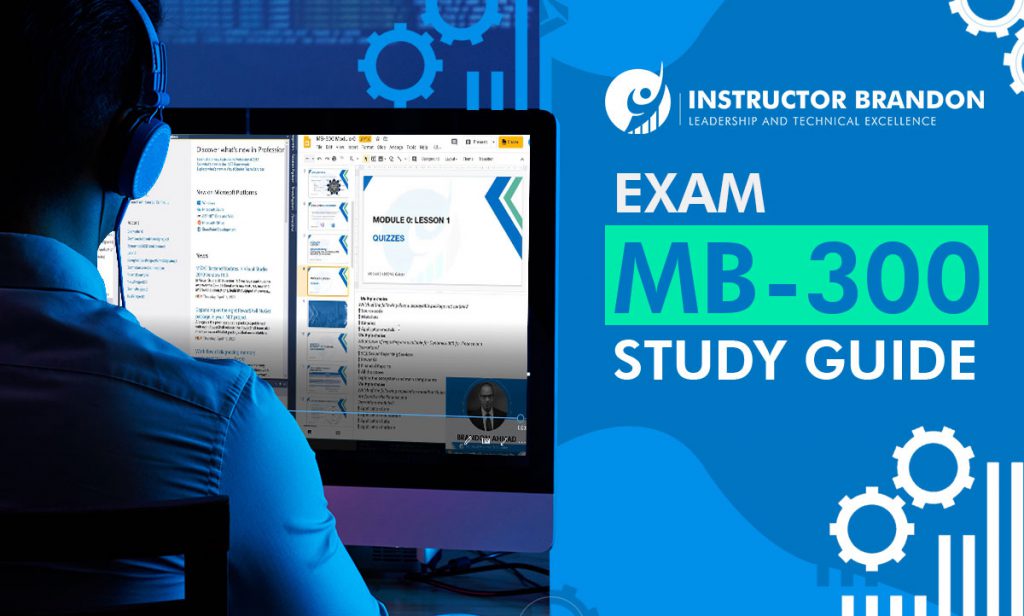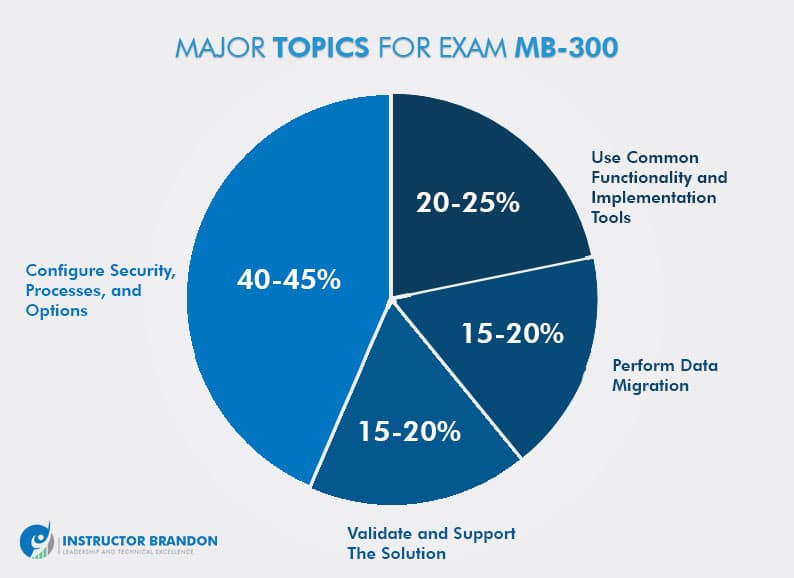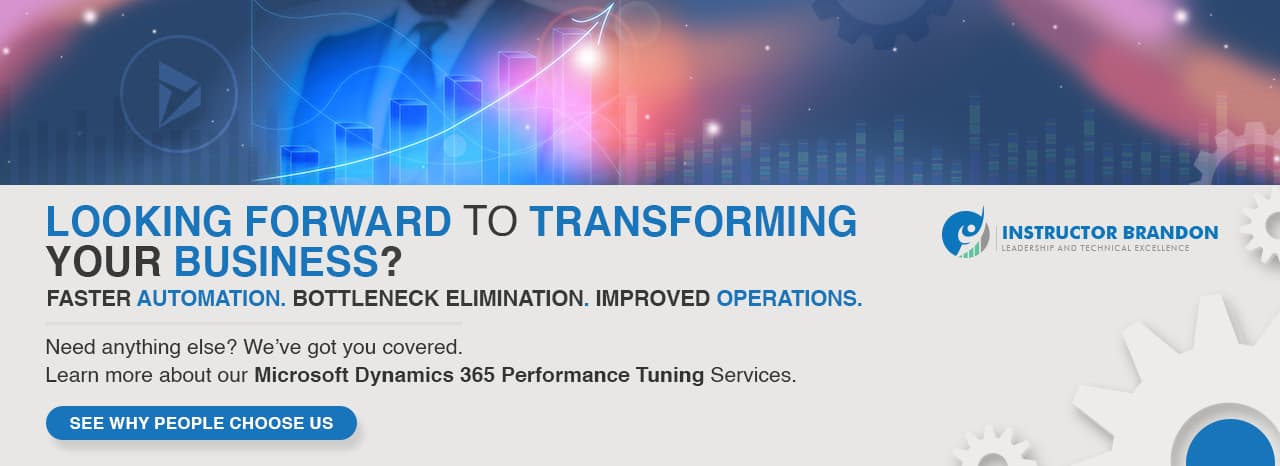Exam MB-300
Exam MB-300 Instructor Brandon Study Guide: Microsoft Dynamics 365: Finance and Supply Chain Core
The exam MB-300 is pretty highly requested, and it’s one of the very popular Microsoft exams for Dynamics 365 (F&S). There are a lot of common questions about what the exam covers and what it doesn’t cover. So this study guide covers important things related to the exam MB-300 like going over the major topics that are a part of it to go ahead and make sure that you get a pretty good understanding. I hope you all sincerely like our innovative content. And as always, don’t hesitate to reach out to me.. I’m always here to help. — Brandon Ahmad
This is the second article on obtaining the Microsoft Dynamics 365: Finance and Operations Apps Developer Associate certification. In this blog post we will provide MB-300 study guide to outline and explore the topics covered by this exam using our course MB300T00.
How to use this exam MB-300 study guide?
This exam MB-300 study guide includes useful information on how to prepare for exam MB-300 using MB-300 material and our courseware. In this guide we have mentioned the names of the modules of our premiere instructor-led Course MB300T00 at InstructorBrandon relevant to the major topics of the exam making it easier to track the desired topics of the course. Also, there are multiple clickable links added throughout the guide to offer additional information about various topics for a better understanding of the fundamental concepts.
Why is certification so important?
With all the practical knowledge developers get while working for different projects, they need to stand out in their Dynamics 365 career by achieving something more. The next move should be getting Microsoft Certification.
Microsoft certification has become an expected component of a Dynamics 365 developer CV, along with a deeply technical resume. When you think about it, this only makes sense. It is Microsoft’s assertion that:
- You have invested in achieving professional status in your field
- Your knowledge base includes the topics Microsoft says it should
- Knowledge base is adequate to the workload described by the certification
- Your knowledge base is current and will continue to be so
- All this has been verified by study and examination.
Of course, a certification can only verify so much about you; but the lack of a certification today speaks volumes as well.
This certification requires passing two exams:
- Exam MB-300: Microsoft Dynamics 365: Core Finance and Operations
- Exam MB-500: Microsoft Dynamics 365: Finance and Operations Apps Developer
At Instructor Brandon we are releasing our premiere instructor-led courses to provide training in these skill sets:
- Course MB300T00 – Microsoft Dynamics 365 Core Finance and Supply Chain
- Course MB500T00 – Microsoft Dynamics 365 Finance and Supply Chain Apps Developer
- Boot Camp for Microsoft Dynamics 365 Finance and Supply Chain MB300 & MB500 training series
Our courses feature
- enhanced labs with free access to MSDN, Visual Studio/DevOps, life cycle service and Office 365 licenses
- expert instruction by Brandon Ahmad, regional lead for Microsoft Certified Trainers — USA
- 24/7 access during 30-day course period via mobile app
- extended content for more hands-on learning and known pain points
- enhanced quizzes after each module.
- access to member-only support gateway for help and support
Today we will review the MB-300 material, using our courseware as a guide to the subject matter.
Major topics for MB-300 Exam
The exam MB-300 will be testing skills on the four major topic areas mentioned below. In this exam MB-300 study guide, we have included the relative percentage of each major topic area on the exam.
- Use common functionality and implementation tools (20-25%)
- Configure security, processes, and options (45-50%)
- Perform data migration (15-20%)
- Validate and support the solution (15-20%)
1. Use common functionality and implementation tools (20-25%)
This section of the exam has a weight of 20-25% and it covers identifying common Microsoft Dynamics 365 Finance features and functionality and implementing Lifecycle Services (LCS) tools.
Our course MB-300T00 covers these topics in
- Module 00: Get Started with Dynamics 365 for Finance and Supply Chain
- Module 01: Get Started with Lifecycle Services for Dynamics 365 for Finance and Supply Chain
Students can gain hands-on experience with and understanding of the functionality and tools of Lifecycle Services for Finance and Supply Chain, Task Recorder, the LCS Issue Search tool and results analysis, and how to use the Regression Suite Automation Tool.
There are three demonstrations covering reusing existing assets and copying and sharing data. Upload, import, copy and save an asset to the Asset Library, and upload a new version for a specific asset. Access a free lab environment to practice using task recording, creating a business process model and a support incident.
2. Configure security, processes, and options (45-50%)
This section has the major weight in the exam – about half of the exam will be based on these subjects. The following modules of MB-300T00 cover these topics:
- Module 05: Create, Maintain and Use Workflows in Dynamics 365 for Finance and Supply Chain
- The Module 06: Set Up and Configure Legal Entities in Dynamics 365 for Finance and Supply Chain
- Module 07: Manage users and security in Dynamics 365 for Finance and Supply Chain
- The Module 09: Implement Common Integration Features in Dynamics 365 for Finance and Supply Chain
All these modules have additional content in lessons added to Microsoft’s official course along with demonstrations, labs with real-world scenarios, and quizzes for all the modules. The course has 24/7 access with a mobile learning app so you can make most of your training investment.
3. Perform data migration (15-20%)
Ability to perform data migration is an extremely frequent expectation of developers in real-life implementations. This includes planning a migration strategy and preparing data for migration. For this, our course MB-300T00 has two modules equipped with detailed lessons, demonstrations, lab exercises and quizzes to equip you for this task:
- Module 10: Prepare Data for Migration and Migrate Data to Dynamics 365 for Finance and Supply Chain
- Module 11: Use Data Management in Dynamics 365 for Finance and Supply Chain and
In these modules, students will study and work with common migration scenarios and related tools, determine migration scope, identify relevant data entities and elements based on given scenarios, and establish migration strategy processes. You will identify and extract source data, generate field mapping between source and target data structures, support the transition between the existing and migrated systems, and, importantly, perform a test migration and validate the output from the process.
You will perform exercises exploring the Data Management Workspace, and export and import data to Finance and Operations. Module 10 has a demonstration on the BYOD feature and how to configure entity export.
4. Validate and support the solution (15-20%)
This is the last section of the exam, with 15-20% weight. However, its weight in the exam does not express the importance of the next two modules in delivering professional-level implementation solutions.
Developers must understand and have hands-on experience implementing and validating solutions within Application Lifecycle Management (ALM) by using LCS. Our course provides two modules with enhanced and detailed lessons and custom demonstrations/labs/quizzes:
- Module 12: Perform User Acceptance Testing (UAT) for Dynamics 365 for Finance and Supply Chain
- Module 13: Preparing for Go-Live
Concepts and tasks covered include
- user acceptance testing (UAT)
- prepare and validate to Go live
- build test scripts to test business functionality
- test case automation using the Regression Suite Automation Tool (RSAT)
- demonstrate the correlation between test scripts and business requirements
- monitor validation test progress and
- make ad hoc changes during validation testing to correct identified issues.
- perform a solution gap analysis
- use LCS tools to identify, report, and resolve issues
- manage Microsoft Dynamics 365 One Version.
Exam MB-300 Syllabus
1. Use common functionality and implementation tools (20-25%)
Identify common Microsoft Dynamics 365 Finance features and functionality
- determine when to use workspaces
- identify use cases for Power Platform apps including Power Apps, Power BI and Microsoft Flow
- identify and differentiate between the global address book and other address books
- demonstrate Work Items functionality
- demonstrate Microsoft Dynamics 365 Finance navigation techniques
- identify Inquiry and Report types available in a default installation
Implement Lifecycle Services (LCS) tools
- identify opportunities to re-use existing assets
- analyze Business Process Modeler results and identify gaps in functionality
- including creating an Acceptance Testing BPM library and analyzing the results
- use the LCS tools including Issue Search and analyze results
2. Configure security, processes, and options (45-50%)
Implement security
- identify and distinguish between the various standard security roles in Finance and Operations
- distinguish between duties, privileges, and permissions
- assign users to security roles based on given scenarios
Design and create workflows
- identify opportunities for automation and controls based on customer workflows
- configure workflow properties and elements
- troubleshoot workflows
Configure options
- set up and configure legal entities
- configure base number sequences
- import or create all necessary startup data including Zip/Postal Code data, customers, vendors, and products
- configure the calendars and date intervals
- units of measure and conversions
- posting profiles and definitions
- create organization hierarchies
- apply purposes and policies
- describe and apply user options
Implement Microsoft Dynamics 365 Finance common features
- configure Microsoft Office integration with Microsoft Dynamics 365 Finance
- configure email (SMTP/Exchange)
- create and maintain email and record templates
- integrate Power BI with Entity store
- create, export, and import personalizations
- set up network printing
Implement business processes for the solution
- define use case scenarios
- participate in phase-based planning processes and the solution design
- design and create workflows
- set up batch Jobs and alerts
- use business process workspaces
3. Perform data migration (15-20%)
Plan a migration strategy
- identify common migration scenarios and tools in Microsoft Dynamics 365 Finance
- determine migration scope
- identify relevant data entities and elements based on given scenarios
- establish migration strategy processes including migration scope
Prepare data for migration and migrate data
- identify and extract source data
- generate field mapping between source and target data structures
- support the transition between the existing and migrated systems
- perform a test migration and validate output from the process
4. Validate and support the solution (15-20%)
Implement and validate the solution within Microsoft Dynamics 365 Finance
- perform user acceptance testing (UAT)
- prepare and validate to Go live
- build test scripts to test business functionality
- automate test case automation by using the Regression Suite Automation Tool (RSAT)
- demonstrate the correlation between test scripts and business requirements
- monitor validation test progress and make ad hoc changes during validation testing to correct identified issues
Support Application Lifecycle Management (ALM) by using LCS
- perform a solution gap analysis
- use LCS tools to identify, report, and resolve issues
- manage Microsoft Dynamics 365 One Version
Conclusion: D365 Finance and Operations Core Exam MB-300 Study Guide
As you can see, the MB-300 material is very substantial, highly technical, and includes a host of fairly recent additions to the classical understanding of the developer role. Certifying in this content will require the best resources, your best efforts and sticking to it until you succeed. Our Course MB300T00 – Microsoft Dynamics 365 Core Finance and Operations features many best opportunities to encounter, study, discuss and practice this material on your own lab system, with enhanced content, expert instruction under an experienced practitioner, mobile access and a 30-day period of access to all class-related materials.
Thank you for using our exam MB-300 study guide and we hope you found it beneficial to prepare well for the exam MB-300. If you’re interested to check out our other exam guides, look at our Dynamics 365 Finance and Operations Apps Developer Exam MB-500 Study Guide
We sincerely hope that you liked our exam MB-300 study guide and got the answers to your most common exam MB-300 related concerns especially about its major topics. And as always, if you need to reach me, you know how to get in touch by reaching out to me here. — Brandon Ahmad, founder of InstructorBrandon and Dynatuners.
[sc_fs_multi_faq headline-0=”h2″ question-0=”How to use this exam MB-300 study guide?” answer-0=”This exam MB-300 study guide includes useful information on how to prepare for exam MB-300 using MB-300 material and our courseware. In this guide we have mentioned the names of the modules of our premiere instructor-led Course MB300T00 at Instructor Brandon relevant to the major topics of the exam making it easier to track the desired topics of the course. Also, there are multiple clickable links added throughout the guide to offer additional information about various topics for a better understanding of the fundamental concepts.” image-0=”” headline-1=”h2″ question-1=”Why is certification so important?” answer-1=”With all the practical knowledge developers get while working for different projects, they need to stand out in their Dynamics 365 career by achieving something more. The next move should be getting Microsoft Certification. Microsoft certification has become an expected component of a Dynamics 365 developer CV, along with a deeply technical resume. When you think about it, this only makes sense.” image-1=”” headline-2=”h2″ question-2=”D365 F&O Core Exam MB-300 Study Guide” answer-2=”As you can see, the MB-300 material is very substantial, highly technical, and includes a host of fairly recent additions to the classical understanding of the developer role. Certifying in this content will require the best resources, your best efforts and sticking to it until you succeed. Our Course MB300T00 – Microsoft Dynamics 365 Core Finance and Operations features many best opportunities to encounter, study, discuss and practice this material on your own lab system, with enhanced content, expert instruction under an experienced practitioner, mobile access and a 30-day period of access to all class-related materials.” image-2=”” count=”3″ html=”true” css_class=””]
 7422
7422 


